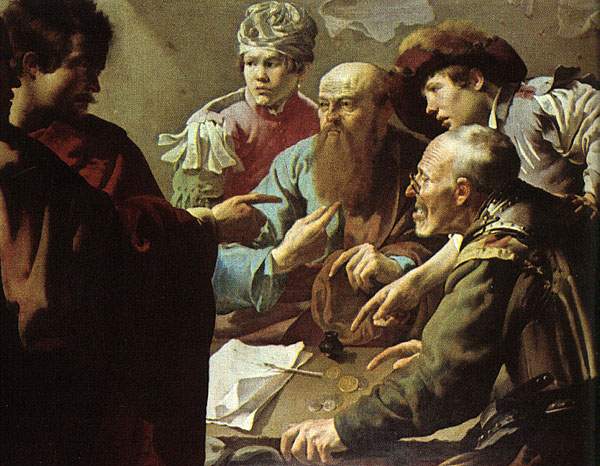Feast of Saint Matthew
(Celebrated 21 Sept
1999)

Matthew 9:9-11
As Jesus moved on, he saw a man named Matthew
at his post where taxes were collected. He said to him, "Follow me."
Matthew got up and followed him. Now it happened that, while Jesus
was at table in Matthew's house, many tax collectors and those known
as sinners came to join Jesus and his disciples at dinner. The
Pharisees saw this and complained to his disciples, "What reason can
the Teacher have for eating with tax collectors and those who
disregard the law?" Overhearing the remark, he said: "People who are
in good health do not need a doctor; sick people do. Go and learn
the meaning of the words, 'It is mercy I desire and not sacrifice.'
I have come to call, not the self-righteous, but
sinners."
Text from :: Lectionary for
Mass
Lectionary for Mass, Copyright © 1970 Confraternity of
Christian Doctrine; © 1969, International Committee on English in
the Liturgy, Inc. All rights reserved.


Saint Matthew inspired by an Angel
 One of the greatest evangelists is, of course,
Saint Matthew the Apostle, whose account of Christ's teaching and
life, the first book of the New Testament, are the most detailed and
complete - the most accurate catechism, if you will, for the
Christian faithful. As his gospels reveal, He wasn't always Matthew.
He was born in Capharnaum with the name Levi, the son of Alphaeus,
who was a tax collector. As was the custom of those times, the
father's trade was handed down to the son and so Matthew, too,
became a tax collector. As we all know he abandoned being a publican
when called by Our Lord to follow him while sitting in the
tax-collector's seat in Capharnaum. Matthew's Gospel, written in
Aramaic - the "Hebrew tongue" mentioned in the Gospel and the Acts
of the Apostles, was written to fill a yearning need to reach his
fellow Palestinians who included both believers and non-believers.
For believers his writings served as a token of his regard and as
encouragement for the trials to come, specifically to prevent
falling back into the ways of Judaism; for the unbelievers, his
gospel was intended to convince them that Jesus was indeed the
Messiah in the flesh in Whom all promises of the Old Testament had
been fulfilled in a spiritual way as opposed to the more expected
material or carnal manner that He would come as a conquering king.
Matthew emphasized this, referring to the "Kingdom of God" or the
"Kingdom of Heaven" in well over 50 incidences in his gospel. After
the Ascension and Pentecost Sunday, Matthew remained in Jerusalem
writing, but shortly after the persecution of Harold Agrippa I began
in 42 AD, he left Israel to preach in Parthia and Persia first, and
then later went to Ethiopia where he received his crown of martyrdom
and was reunited with his Master, Whom he had written so faithfully,
fully and accurately for and about. His relics were discovered and
transferred in the 10th Century to Salerno Italy at the coordination
of Pope Gregory VIII. One of the greatest evangelists is, of course,
Saint Matthew the Apostle, whose account of Christ's teaching and
life, the first book of the New Testament, are the most detailed and
complete - the most accurate catechism, if you will, for the
Christian faithful. As his gospels reveal, He wasn't always Matthew.
He was born in Capharnaum with the name Levi, the son of Alphaeus,
who was a tax collector. As was the custom of those times, the
father's trade was handed down to the son and so Matthew, too,
became a tax collector. As we all know he abandoned being a publican
when called by Our Lord to follow him while sitting in the
tax-collector's seat in Capharnaum. Matthew's Gospel, written in
Aramaic - the "Hebrew tongue" mentioned in the Gospel and the Acts
of the Apostles, was written to fill a yearning need to reach his
fellow Palestinians who included both believers and non-believers.
For believers his writings served as a token of his regard and as
encouragement for the trials to come, specifically to prevent
falling back into the ways of Judaism; for the unbelievers, his
gospel was intended to convince them that Jesus was indeed the
Messiah in the flesh in Whom all promises of the Old Testament had
been fulfilled in a spiritual way as opposed to the more expected
material or carnal manner that He would come as a conquering king.
Matthew emphasized this, referring to the "Kingdom of God" or the
"Kingdom of Heaven" in well over 50 incidences in his gospel. After
the Ascension and Pentecost Sunday, Matthew remained in Jerusalem
writing, but shortly after the persecution of Harold Agrippa I began
in 42 AD, he left Israel to preach in Parthia and Persia first, and
then later went to Ethiopia where he received his crown of martyrdom
and was reunited with his Master, Whom he had written so faithfully,
fully and accurately for and about. His relics were discovered and
transferred in the 10th Century to Salerno Italy at the coordination
of Pope Gregory VIII. 
[12 Apostles][4 Evangelists][
Saint Andrew ][Saints Peter & Paul][
Saints Simon & Jude][Saints Philip & James]
[
Saint John ][Saint Matthew ][Saint Thomas][
Saint Matthias][Saint Bartholomew][
St.JameGreater]
Last modified: December 08, 1999
| |